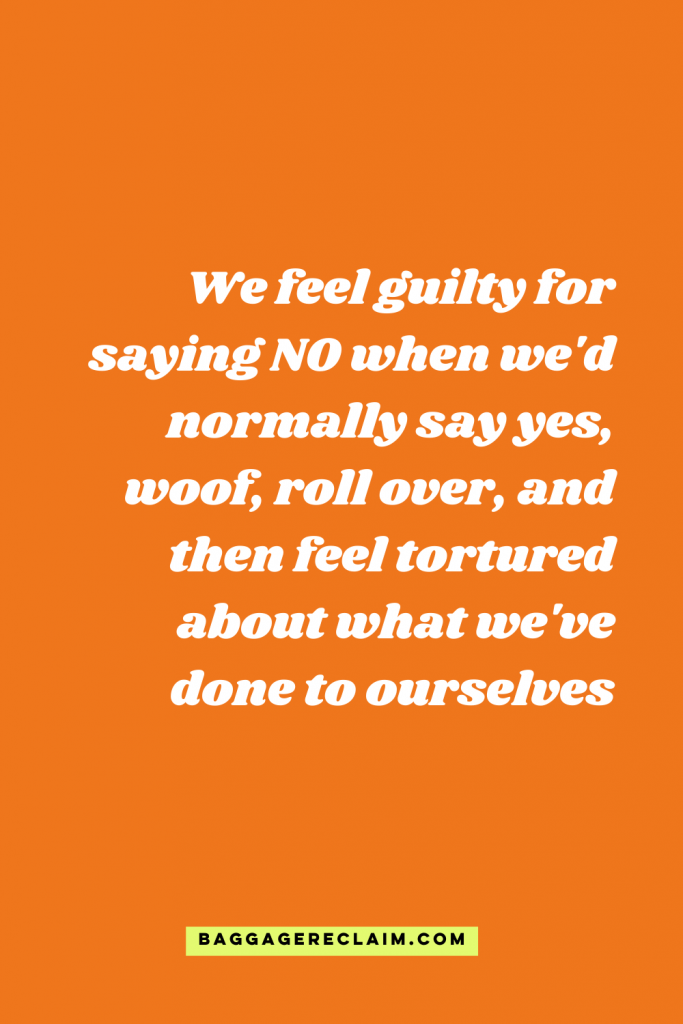Sometimes after I’ve stood up for myself, whether it’s in conflict situations or where I’ve essentially put my stake in the sand and said ‘Yep, this is who I am’ or ‘This is what I care about’ or ‘This is what I’d like to do’, I’ve felt shaken or downright triggered by it. Particularly when I first started actively being more boundaried, it was so far out of my comfort zone that crying my eyes out afterwards accompanied it. My younger self, my inner child, thought that Armageddon or humiliating rejection were on the way.
There was also this sense of injustice and victimisation, like it was unfair to be in the position of standing up for myself. Can’t people just know? Can’t they just do what I want and be half-decent so that I didn’t have to be, well, honest?
And it wasn’t unusual for me to feel as if I’d wounded the person by not being my superaccommodating self, so I’d experience acute guilt. Maybe they don’t like me anymore? What if I’ve hurt their feelings? I’m in trouble.
If there’s one thing we like to do when we have people-pleasing inclinations, it’s to feel guilty for not toeing somebody else’s line.
In fact, most people have some level of discomfort around conflict, so even when they confront a difficult situation, they tend to feel bad afterwards.
We feel guilty for saying no when we’d normally say yes, woof, roll over, and then feel tortured about what we’ve done to ourselves.
We feel guilty for no longer making it our vocation to meet the needs, wishes, and expectations of someone else while sacrificing our own. There’s this sense of betrayal about not doing for others what we needed to do for ourselves first before giving away something that we didn’t have to give. It’s like ‘Oh my god, I’m a terrible person for [not doing my utmost best to anticipate other people’s feelings and behaviour]! I’ve hurt their feelings and made them uncomfortable because I wouldn’t hurt myself to give them what they say they need or want.’
We feel guilty and ‘bad’ because we, for instance, started No Contact and we can’t continue attempting to please someone in an unhealthy relationship. It’s like ‘Why can’t I be going around trying to get their attention and validation and feeling bad with them? Standing up for myself means that I’m now alone, which feels like a punishment.’
We feel guilty for being honest, which differs greatly from being rude. Honesty is communicating the truth with respect. Some of us carry on like anything that doesn’t brown-nose those around us and cater to their egos is ‘rude’.
We feel guilty for having an opinion and actually saying that we don’t agree.
Guilt is a feeling of having committed wrongdoing. That’s where you learn a lot about your perception of yourself and your rights.
If you feel guilty for standing up for yourself, you’re essentially saying ‘It is wrong of me to assert myself’.
Why is it wrong for you to represent your own needs, desires, expectations, feelings, and opinion? Why is it wrong for you to say no?
While we associate ‘standing up for ourselves’ with confrontation, so having to defend, discuss, argue and protect, and being strong in the face of conflict and criticism, it’s also about representing who we are. Each time we embody our values, so our character and the things, relationships and opportunities that matter to us, we’re voting for who we are and want to be.
By limiting standing up for ourselves to conflict and criticism, we automatically associate it with the potential for rejection, alienation and abandonment. It also makes it that much more loaded. We wait for problems to be honest and authentic instead of doing that in the day to day of our life.
I’m glad that I didn’t interpret feeling ‘bad’ and ‘guilty’ as signs that standing up for yourself is wrong. Instead, they were signposts I hadn’t stood up for myself enough in the past for me to see it as normal.
If we consistently show up as ourselves, while we will still experience discomfort when we need to be vulnerable, we will have enough experience to know that we are OK. We will be able to comfort ourselves that we are not that kid anymore and that we get to have a say in our lives.
Are you ready to stop silencing and hiding yourself in an attempt to ‘please’ or protect yourself from others? My book, The Joy of Saying No: A Simple Plan to Stop People Pleasing, Reclaim Boundaries, and Say Yes to the Life You Want (Harper Horizon), is out now.

Pin For Later


 Add to favorites
Add to favorites 